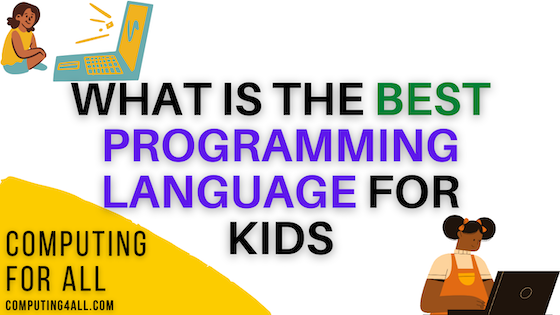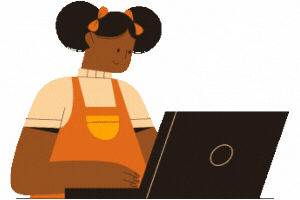
Programming languages for kids
One of the most significant advantages of learning a programming language as a child is that she/he will use it for many years to come and keep mastering it. A second advantage of learning a programming language at a young age is that it is a lot of fun that stimulates the brain with sophisticated logical deductions. The third advantage of learning a programming language at an early age is that a fresh mind captures a language, whether it is a natural language or programming, effectively and effortlessly!
In this article, I answer several general questions related to programming languages and coding for kids.
Contents
Do kids need to learn to code?
Computers and technology are going to play an essential role in our children’s future. Problem-solving using programming will prepare them for the many opportunities that lie ahead. Coding to solve problems is one of many important skills that kids need to acquire to have a head start preparing for a technology-driven society.
How early can a child learn to code?
Depending on a child’s interest, a child can start to learn to code as early as seven or eight years of age. Of course, a child will not be mastering an entire programming language at this age, but she/he will be able to learn the basic concepts quickly. Understanding the concepts of variables, data types, conditions, conditional statements, and looping is somewhat plausible for eight-year-old children. More programming practice will develop problem-solving skills in the coming years.

It is common to use block-based concepts to involve children of even younger age, such as four, five, or six, in programming. Block-based programming concepts are popular for elementary and middle school students too. Scratch and Tynker are two such block-driven programming tools for children. While these visual tools help children develop a sense of how to design logical steps to accomplish a task, I feel that children do not gain the essential programming skills that they could grow by writing codes. I am an advocate of letting children play with a real programming language.
What is the best programming language for a child to learn?
Python. I recommend Python programming language for children. If a child is older than seven years, she/he will be able to grasp the basic concepts in no time. Parents need to make sure that the child gets back to programming frequently (of course, if the child is enthusiastic about learning to code.) It is easy for children to pick up new things as well as it is easy for anyone to forget a skill without enough practice. Three to four times a week, 30 minutes to an hour of programming practice each time, will be great.
What are the other programming languages that a child can start with? There are many programming languages (Java, C, C++, Lua, C#) that a child can begin with. I prefer Python for its wide use in many fields and the easiness to grasp the syntax. It is not overly difficult to learn a programming language for someone who already knows one. If a child masters Python in several years, then learning another programming language will be straightforward.
How can a child learn to code in Python if parents do not have programming skills?
All of us have acquired skills in our life that our parents did not have. Our children will also gain skills that we never had. All we have to do is present the opportunity to them. Books are always great for learning. Programming is a skill that can be developed by reading a programming book and implementing the instructions using a computer. I searched with the phrase “python programming for kids” on Amazon and found several Python programming books written for kids. A parent can buy a Python programming book that has many great reviews and give the book to the child. Also, help the child from time to time to make sure that she/he can follow the instructions provided in the book.
The book alone is not sufficient. The child will need a computer too. The computer can be an old laptop or a new but inexpensive one — it does not matter. Python is not a resource-hungry tool. A child does not need a high-end computer to learn Python programming.
How will learning to code at an early age help later?
Starting to code in a programming language like Python at an early age will be immensely beneficial as the skill will help a child leverage a competitive advantage growing up in this technological society. The primary expertise developed with proficiency in a programming language is the skill of problem-solving. The child will develop problem-solving skills expected of any discipline nowadays.
In the coming years, problem-solving skills with coding ability will become expected expertise in many jobs. Having the right programming expertise in any STEM (Science, Technology, Engineering, and Math) field already gives extra mileage. In this modern technology-driven society, the ability to analyze data is becoming more important in every discipline. Analysis of massive amounts of data requires sophisticated algorithms available as packages with many programming languages.
Will nurses, doctors, and other health professionals require programming skills? Coding to solve problems accumulates “technical know-how” for anyone. The technical know-how of programming will help a doctor or a health professional develop great ideas for engineers to serve patients better. Examples of some applications are software to monitor target information of patients, patient information management tools, and artificial intelligence-based systems to help health professionals in diagnosing or treating illness.
Conclusion
Once children have learned coding and programming, they will have the opportunity to use this skill for many different projects throughout their lives. Programming and problem-solving skills will prepare your kid for a fulfilling future and allow her or him to choose a fulfilling and challenging job. As long as your kid loves to learn, there is no reason why she or he cannot turn into one of the best programmers in the world.
Subscribe to receive notifications of our new posts.
Subscribe to our YouTube Channel to receive notifications when we post YouTube videos:
